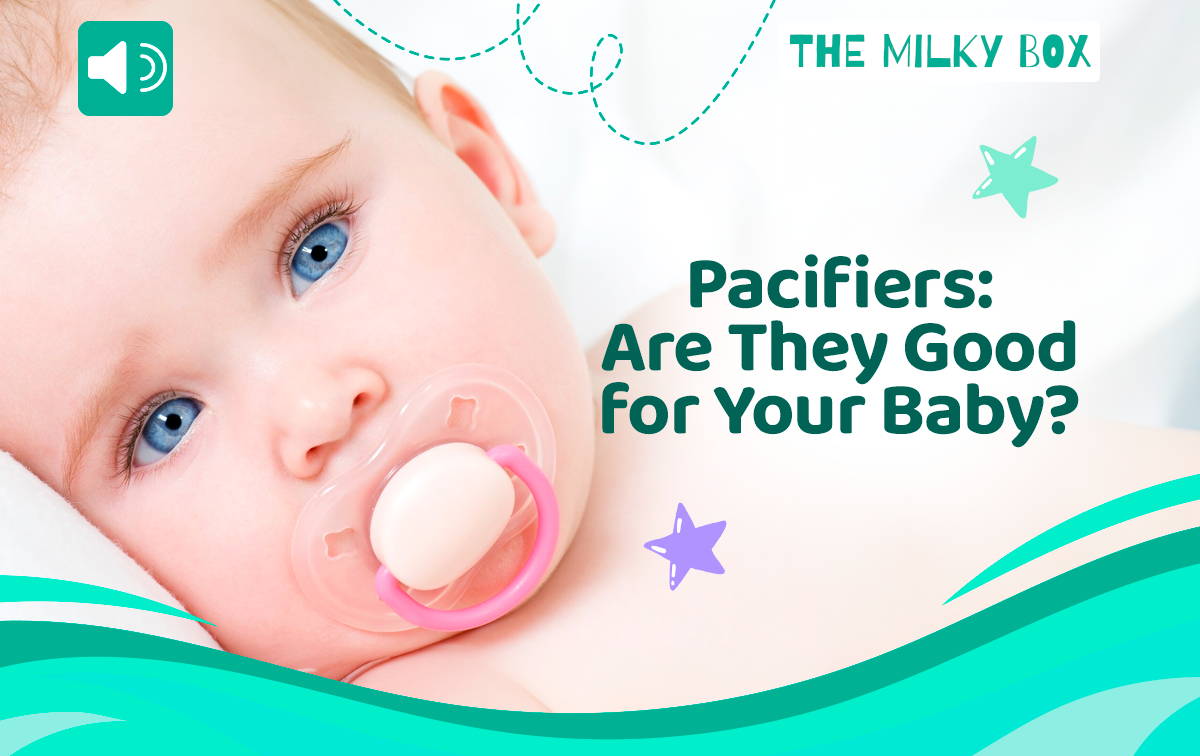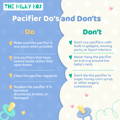Yes, pacifiers can be given to a healthy breastfed baby from birth. Studies have shown that using a pacifier in healthy breastfeeding babies, starting from birth or after lactation is established, did not significantly impact the frequency or duration of exclusive and partial breastfeeding up to age 2.
Pacifiers: Are They Good for Your Baby?
By: Suzanne Renee' - Updated May 7, 2024 - 8 Minute Read

Families make many decisions for the best health and well-being of their little ones in the first year. Some decisions are made before the baby is born, and some are made along the way.
Families face a question in the early days of having a baby: whether or not they should give their little one a pacifier. There are many opinions and advice on this subject.
In this article, we will take a closer look at the topic of pacifiers.
When Should You Introduce a Pacifier to Your Baby?
Nonnutritive sucking is a natural reflex for a fetus and newborn, usually first recognized by sucking the hands and fingers. Pacifiers have been used as a method of soothing throughout history.
Pacifiers help parents and infants get through periods of crying when the infant is either not hungry or too full to eat but still needs the comfort that the instinctual sucking reflex provides.
Families have found that pacifiers can be especially helpful to most kids in the early months when sleep and quiet moments can be elusive.

Should You Give Your Baby a Pacifier?
Every infant is unique, with distinct needs. Ultimately, whether or not you offer your baby, a pacifier is a personal decision.
Pros and Cons of Pacifiers
Trying to decide what is best for your infant is not always a cut-and-dry decision. Here are some benefits and potential drawbacks of pacifier use.
Pacifier Benefits
Pacifiers are popular for a reason. They can bring your baby comfort, help them sleep, and the most significant advantage - reduces the risk of SIDS.
🚼 Provides Comfort
Your newborn is experiencing their senses all at once for the first time outside the womb. Everything is unfamiliar, and this can feel overwhelming for your baby. A pacifier can add to the reassurance of a familiar face and soothing voice of caregivers.
A pacifier is a terrific way to provide comfort for your baby and give parents a little break. A pacifier offers your baby the chance to suckle, and it can lead to the first steps to self-soothing for the older infant.
🚼 Helps Baby Fall Asleep
While a pacifier may not improve the quality of your baby's sleep, it may help the baby fall asleep faster. Whether bottle-fed or breastfed, your baby has the innate desire to suck. Breastfeeding infants often want to nurse when falling asleep because it's comforting.
As your little one moves out of the newborn stage, offering a pacifier may allow for an easier way for them to fall asleep alone without rocking or nursing for comfort.
🚼 Premature Babies
Pacifiers are an excellent tool for aiding preemies and term infants in their feeding journey. Studies have shown that preemies who are given pacifiers are more likely to succeed in sucking and transition to oral feeding faster.
Likewise, term infants can benefit from pacifier use when they require additional support in latching, making the feeding process smoother and less stressful for both the infant and the parent.
🚼 Reduces the Risk of SIDS
SIDS (Sudden infant death syndrome) is the leading cause of death in babies under one year of age. Studies have shown that using a pacifier during sleep reduces the chances of a baby suffering from sudden infant death syndrome (SIDS) by as much as 90 percent.
This is significant and can bring peace of mind at night, knowing that your baby is safer while they fall asleep.
Pacifier Drawbacks
While a pacifier offers families some much-needed comfort, there are some downsides to introducing these soothers.
🚼 Nipple Confusion
There is a theory that pacifiers should only be introduced when breastfeeding is well established.
The primary reason is that your baby uses a different suckling technique when using a pacifier versus nursing at the breast. The worry is if introducing a pacifier too soon; it can negatively impact the breastfeeding relationship. Your baby may grow to prefer the pacifier, turning away from nursing because of the effort it requires.
Not to worry though. Findings have shown that a pacifier is not going to make breastfeeding impossible and can help to calm a fussy baby.
🚼 Dental Development
A prolonged and frequent pacifier habit can eventually lead to a tough habit to break and dental problems such as crooked teeth or bite issues in your baby’s mouth.
The American Academy of Pediatric Dentistry recommends and discourages pacifier use after the second year. Restricted pacifier use can keep more significant dental worries at bay.
🚼 Concern Over Plastic Chemicals
When choosing a pacifier, consider one made in the EU which has more stringent requirements about the endocrine disrupting chemical BPA. This has been linked to various developmental and disease risks. Also, plastic being chewed on ultimately results in plastic being swallowed.
So with the growing recognition that many individuals are swallowing copious amounts of plastic on a regular basis, we want to minimize the potential intake our infants have, as there are multiple health concerns with this being raised in current studies.

Pacifier Do's and Don’ts
There are some simple rules regarding pacifier use. As always, safety is paramount.

Pacifiers and Breastfeeding
Introducing pacifiers at the right time may be vital to avoiding breastfeeding complications. To reduce the experiencing challenges, the American Academy of Pediatrics (AAP) recommends that parents begin introducing pacifiers after breastfeeding is well established, generally around 3 to 4 weeks of age.
Since babies use the same sucking technique when using a pacifier and a bottle, you don’t need to worry about nipple confusion if your baby is exclusively bottle-fed. Using a pacifier right from the start should not cause worry.
Breast, bottle or combination fed families can feel confident knowing that a pacifier can aid in providing a safe infant sleep environment.
Can a Pacifier Help with Bottle Feeding?
Babies can benefit from establishing routines that help them learn to organize their mouth movements, which can have a calming effect on them. One such routine involves offering a pacifier to your baby for 20 to 30 seconds before bottle feeding.
This practice can help your baby prepare more calmly for feeding, allowing them to focus on sucking without being overly fussy. You can gently pull on the pacifier as your baby sucks on it, which can also help to soothe them and make bottle feeding a more enjoyable experience for both you and your baby.

Are Pacifiers Bad for Baby's Teeth?
Using pacifiers in infancy is generally considered safe and, in fact, can be an excellent tool for keeping risks low for dangers such as sleep-related infant deaths.
However, long-term use can lead to dental problems like pacifier teeth. Pediatric Dentists recommended avoiding pacifiers after the second birthday to prevent dental issues and before that time, use increasingly sparingly after the first birthday.
It is also best to avoid adding sweet substances to your little ones’ pacifiers to prevent future decay.
Do Pacifiers Have Side Effects?
Babies and toddlers who overuse pacifiers are more likely to develop middle ear infections. One plausible explanation is that sucking on a pacifier changes the pressure in the throat and ears. Another explanation is that pacifiers can also spread bad bacteria causing infections.
Frequent sanitation, especially when the pacifier falls, and restricted use can solve this particularly worrisome issue.
Pacifiers for Babies
The decision to use a pacifier or not is as unique as your baby’s. Parents and caregivers have many decisions to make starting from the first day, and The Milky Box is here to walk alongside you.
By offering complete balanced nutrition without heavy metals, toxic ingredients, or soy, we ensure that the European baby formula you use will be one of the more accessible choices.
Frequently Asked Questions
Can Pacifiers Be Given to Breastfed Babies?
Are Pacifiers Bad for Your Baby?
Good news! Pacifiers can be highly beneficial. Check out our pros and cons to help you decide if it suits your family and find essential safety tips as well.
Can Pacifiers Help with Air Travel?
Many parents may wonder whether pacifiers help with ear pressure while traveling. The answer is yes!
Sucking on a pacifier can aid in lessening ear pain by increasing the sucking sensation and swallowing flex. These reduce air pressure changes and can provide pain in the Eustachian tubes.
Disclaimer:
Please be aware that this information is based on general trends in babies, and it is not medical advice. Your doctor should be your first source of information and advice when considering any changes to your child’s formula and when choosing your child’s formula. Always consult your pediatrician before making any decisions about your child’s diet or if you notice any changes in your child.
Breastfeeding is the best nutrition for your baby because breast milk provides your child with all the essential nutrients they need for growth and development. Please consult your pediatrician if your child requires supplemental feeding.

Suzanne Renee' is an accomplished professional with extensive expertise in the area of infant nutrition, dedicated to promoting the health and wellbeing of children. She started this journey as a foster parent. Suzanne has emerged as a strong proponent of the European baby formula and has become a full time writer of the subject. In her free time, she enjoys camping, hiking and going to church.
Read Next:
Reviewed by Dr. Eric Wood, ND, MA

Dr. Wood is a licensed naturopathic doctor, with a doctorate degree from the Canadian College of Naturopathic Medicine in Toronto, Canada. He received his post-graduation certification in Mind Body Medicine at Harvard University.
With 15 years of experience, Dr. Wood is an Associate Professor of Holistic Nutrition at the American College of Health Sciences in Portland, Oregon. Dr. Wood is an educator, clinician, author, media figure, consultant, and owns his own holistic (naturopathic) medical practice in Ft. Lauderdale, Florida. Dr. Wood is currently researching and drafting books on cancer and pediatrics.
Outside of the medical profession, Dr. Wood loves singing with the Miami Lyric Opera and is an avid musician in South Florida. He also loves spending time with his wife and kids.

